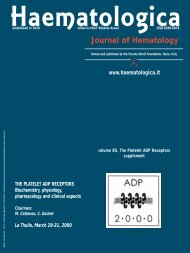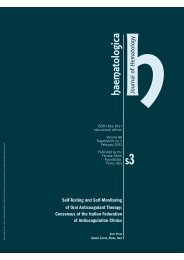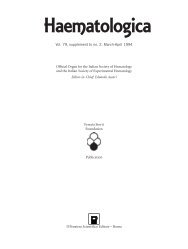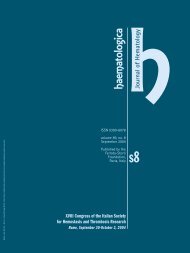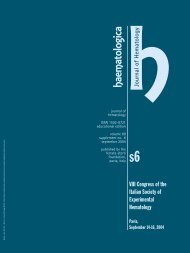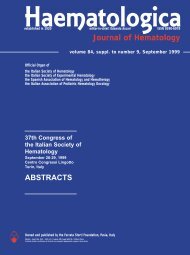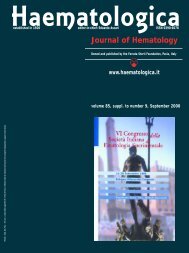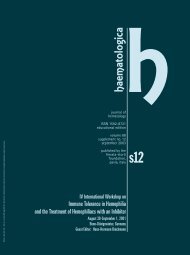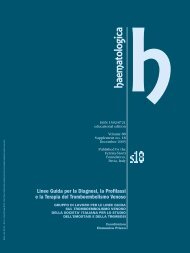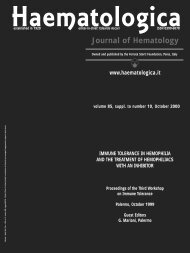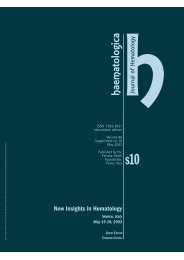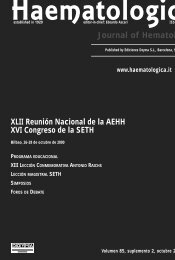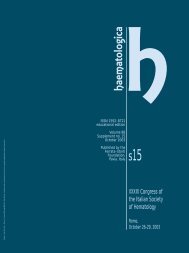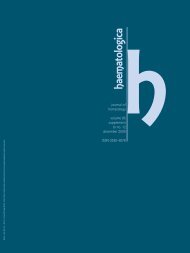Haematologica 2003 - Supplements
Haematologica 2003 - Supplements
Haematologica 2003 - Supplements
Create successful ePaper yourself
Turn your PDF publications into a flip-book with our unique Google optimized e-Paper software.
myeloma. Blood 2001; 98:210-216.<br />
6. Treon SP, Agus DB, Link B, Rodrigues G, Molina A,<br />
Lacy MQ, Fisher DC, Emmanouilides C, Richards AI, Clark B,<br />
Lucas MS, Schlossman R, Schenkein D, Lin B, Kimby E,<br />
Anderson KC, Byrd JC: CD20 directed serotherapy induces<br />
responses and facilitates hematological recovery in patients with<br />
Waldenstrom’s macroglobulinemia. J Immunotherapy 2001;<br />
24:272-279.<br />
7. Treon SP, Mitsiades C, Mitsiades N, Young G, Doss D,<br />
Schlossman R, Anderson KC: Tumor cell expression of CD59 is<br />
associated with resistance to CD20 serotherapy in B-cell<br />
malignancies. J Immunotherapy 2001; 24:263-271.<br />
8. Treon SP, Belch AR, Kelliher A, Shima Y, Mitisiades<br />
CS, Mitisades NS, Szczepek A, Ellman L, Harmon D, Grossbard<br />
ML, Preffer FI, Pilarski LM, and Anderson KC: CD20-directed<br />
serotherapy in multiple myeloma: Biological considerations and<br />
therapeutic applications. J Immunotherapy 2002; 25:72-81.<br />
9. Treon SP, Emmanouilides CA, Kimby E, Branagan<br />
AR, Mitsiades C, Anderson KC, Frankel SR. Pre-therapy serum<br />
levels predict clinical response to extended Rituximab in<br />
Waldenstrom’s macroglobulinemia. Blood 2002; 100:813a.<br />
10. Treon SP, Wasi P, Emmanouilides CA, Kimby E, Lister<br />
A, Morel P, Frankel S, Preffer F, Kelliher A, Branagan A,<br />
Anderson KC. Combination therapy with rituximab and<br />
fludarabine is highly active in Waldenstrom’s<br />
macroglobulinemia. Blood 2002; 100:211a.<br />
11. Treon SP, Fox EA, Hansen M, Verselis S, Branagan<br />
AR, Touroutoglou N, Maloney DG, Frankel SR, Anderson KC.<br />
Polymorphisms in Fc gamma RIIIa (CD16) receptor expression<br />
are associated with clinical response to Rituximab in<br />
Waldenstrom’s macroglobulinemia. Blood 2002; 100:573a.<br />
12. Treon SP, Hayashi T, Anderson KC. Treon SP.<br />
Rituximab induced antibody dependent cell mediated cytotoxicity<br />
(ADCC) is enhanced by thalidomide and its analogue Revimid.<br />
Blood 2002; 100: 314b.<br />
13. Treon SP, Kelliher A, Keele B, Frankel S,<br />
Emmanouilides C, Kimby E, Byrd JC, Schlossman R, Mitsiades<br />
N, Mitsiades C, Preffer F, Anderson KC. Expression of<br />
serotherapy target antigens in Waldenstrom’s<br />
macroglobulinemia: Therapeutic considerations and<br />
conmsiderations. Sem Oncology <strong>2003</strong> (manuscript in press).<br />
14. Hayashi T, Treon SP, Hideshima T, Tai YT, Akiyama<br />
M, Richardson PG, Chauhan D, Grewal I, and Anderson KC.<br />
Recombinant humanized anti-CD40 monoclonal antibody<br />
triggers autologous antibody-dependent cell-mediated<br />
cytotoxicity against multiple myeloma cells. Br J Haematology<br />
<strong>2003</strong> (in press).<br />
13. Vaccination strategies in multiple<br />
myeloma<br />
P13.1<br />
DNA VACCINATION: FROM THE LABORATORY TO<br />
THE CLINIC<br />
FK Stevenson, G di Genova, J Roddick, F McNicholl, H<br />
McCarthy, J Watkins, SS Sahota, A King, J Rice, N Russell,<br />
TJ Hamblin, CH Ottensmeier<br />
Molecular Immunology Group, Tenovus Laboratory, Southampton<br />
University Hospitals Trust, Southampton SO16 6YD, UK. Tel:#44<br />
2380 796923, email: fs@soton.ac.uk<br />
Introduction: DNA vaccines deliver encoded protein to the<br />
immune system and can activate antibody and cellular responses.<br />
Many new DNA vaccines against infectious diseases are in<br />
clinical trial in normal adults. For cancer, the concept of placing<br />
safe tumor-derived gene sequences into a vaccine format, and<br />
inducing specific anti-tumor immunity, has obvious attractions.<br />
However, for myeloma, there are two major problems. The first is<br />
that tumor antigens are only weakly immunogenic, and the<br />
second is that patients tend to be immunosuppressed, due either<br />
to disease or to treatment. Both these problems have been<br />
addressed in our study.<br />
To strengthen immunogenicity, we have fused a sequence from<br />
tetanus toxin to the tumor-derived sequence. This strategy<br />
dramatically amplifies the response to the tumor protein and in<br />
pre-clinical models leads to protective immunity. 1 Our first target<br />
tumor antigen for myeloma is the idiotypic immunoglobulin<br />
secreted by the neoplastic plasma cells. This is coded by the<br />
variable region genes, V H and V L which can be readily identified<br />
and isolated from patients’ tumor cells. We assemble these as<br />
single chain Fv (scFv) a convenient way of making a single gene<br />
able to produce idiotypic protein. The tetanus toxin sequence<br />
codes the non-toxic C-terminal fragment (Fragment C (FrC)),<br />
which is highly immunogenic and includes a “promiscuous”<br />
helper determinant able to activate high levels of T-cell help. The<br />
DNA scFv-FrC fusion gene induces specific immunity against a<br />
model myeloma (5T33) with protection mediated by antiidiotypic<br />
CD4+ T cells. 1 This vaccine design is in a trial for<br />
patients with lymphoma which is almost complete. No<br />
significant side-effects of the vaccine have been observed, and<br />
immune responses against both components of the fusion gene<br />
are evident in most patients.<br />
To circumvent the problem of immunosuppression in patients<br />
with myeloma, we are currently vaccinating donors of allogeneic<br />
stem cell transplants. The safety of the DNA vaccines allows this<br />
procedure, and ensures that a maximal response will be obtained.<br />
Immune cells are being transferred to the recipient patients at the<br />
time of donor lymphocyte infusion (DLI). Clearly, to extend the<br />
approach to more patients, we need information on the capacity<br />
of the immune response following conventional chemotherapy<br />
with or without autologous transplantation.<br />
Idiotypic antigen is a useful and safe tumor target, but we aim<br />
also to vaccinate myeloma patients against other antigens. One<br />
class of antigens which is attractive is the cancer-testis antigens,<br />
known to be expressed only by cells of the testis, and by cells of a<br />
range of cancers, including myeloma. 2 To attack these<br />
intracellular antigens, it is necessary to induce cytotoxic T cells<br />
(CTL) which can recognize processed peptides presented by the<br />
MHC Class I molecules. For this, we have designed a novel<br />
vaccine incorporating a gene encoding an engineered domain of<br />
the FrC sequence (p.DOM) fused to an epitope from a cancer<br />
S83



